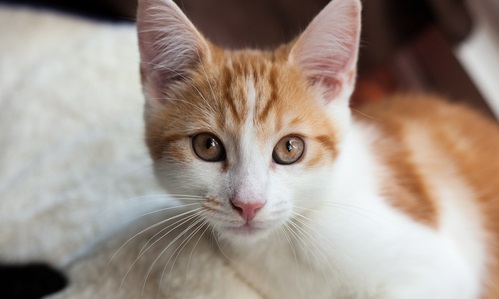Have you noticed your cat shaking his head more than usual? As a pet owner, it can be difficult to watch your pet experiencing something without being able to ask them how they feel. Instead, you’re left to wonder, “Why is my cat shaking his head?” If your cat has been displaying this odd behavior, there could be a number of different potential causes. Finding the right treatment method is dependent on identifying the correct cause. The guide below covers all of the basic information you need to properly assess the situation.
Causes of Head Shaking in Cats
If you’ve noticed your cat shaking his head more frequently and are perplexed at what the possible cause may be, you’re not alone! Ear infections are a common cause of head shaking and scratching in cats and can vary depending on the type of infection your cat has. In addition, other culprits that could be to blame may include foreign objects that are lodged in their ear or an allergy. The first step towards getting your cat the help he needs to start feeling better soon is identifying what the underlying cause of the head shaking is. Below are a handful of potential causes of head shaking in cats and their associated symptoms.
Ear Mites
One of the most common causes of head shaking in cats is ear mites. Ear mites are small parasites that live in and around the ears of cats and are can be passed from feline to feline. If your cat has ear mites, one of the most telltale symptoms is persistent head scratching and shaking as the cat attempts to get relief himself from the discomfort of the mites. One symptom that will help alert you to ear mites is the presence of a dark substance on the surface of your cat’s ears, which may resemble coffee grounds. Once this dark debris has been identified on your cat, it’s safe to assume that your furry companion is suffering from ear mites and a trip to the vet should be underway. Below are the primary symptoms for ear mites in cats.
Symptoms:
- Head shaking
- Scratching of the head, ears, and neck
- Dark debris on the surface of the ears
- Scabs on the skin around the ear
- Strong odor
- Inflammation of the inner ear
- Discharge in the ear canal
- Hair loss around the ears
 If your cat is diagnosed with ear mites, your veterinarian may flush out your cat’s ears to rid them of the mites and prescribe a medication to prevent reinfestation. If one animal in your household is diagnosed with ear mites, it is important to check all other animals and treat them if they are displaying symptoms.
If your cat is diagnosed with ear mites, your veterinarian may flush out your cat’s ears to rid them of the mites and prescribe a medication to prevent reinfestation. If one animal in your household is diagnosed with ear mites, it is important to check all other animals and treat them if they are displaying symptoms.
Mange
Have you heard of mange but aren’t quite sure what it is? While mange in dogs is a common condition, it is much rarer in cats. This feline skin condition is defined by the presence and infestation of mites on a cat, some of which may be parasitic. There are different types of mange mites that can live on cats. Depending on the type of mange, they may prefer to take up their home on the skin of a cat’s ears and head. In these cases, felines will often shake their heads to relieve their discomfort. In some cases, cats may itch until they scratch and rip the skin open, leaving it to become scabbed and covered in distinctively thick crusts. If left untreated, mange can be extremely dangerous and even fatal. Below are the primary symptoms of mange in cats.
Symptoms:
- Intense itching and scratching
- Head shaking
- Restlessness and discomfort
- Hair loss
- Scabbed and crusted skin patches
If you suspect your cat may be suffering from mange, it is vital to get them to a licensed veterinarian for a full examination. A veterinarian will generally scrape the affected area of the skin and examine the scraping under a microscope to confirm whether or not there are mites present. Sometimes this can be a challenge as the mites may bury themselves deep within the skin, in which case the veterinarian will need to rely on the appearance of the condition and the associated symptoms to make an accurate diagnosis.
Foreign Objects
Has your cat started pawing at his ears and shaking his head? One of the first steps to take is to look inside his ears to see if a foreign object has become trapped inside. This can be one of the most common and easily fixed reasons for head shaking in cats and is especially prevalent in outdoor cats. Symptoms may include:
Symptoms:
- Discomfort
- Head shaking
- Pawing at the ear
If you suspect your cat may be suffering from a foreign object stuck in his ear, shine a light inside and see if there is anything that’s easily visible. If it is a larger object that can be removed without resistance or causing your cat discomfort, then you can try to gently remove it yourself. If your cat is uncomfortable, it is better to wait and take them to a veterinarian so that the cat can be sedated and handled by a professional.
Allergies
Did you know that cats can suffer from food and environmental allergies just like human beings? A cat that is experiencing an allergic reaction to food or an environmental allergen may begin to shake his head and itch persistently as a byproduct of his allergic reaction. If your cat has been shaking his head and pawing at his ears and neck without other obvious symptoms, an allergic reaction may be the culprit. Below are a handful of symptoms to watch for if you suspect your cat has allergies.
Symptoms:
- Head shaking
- Persistent pawing and scratching at the ears
- Itchy ears and skin
- Runny eyes
- Vomiting
- Diarrhea
- Paw chewing/swollen pads
Just like with a human being, successfully treating and preventing an allergic reaction is reliant on identifying the correct allergen. This can be difficult with a cat since there could be many food or environmental allergies causing the problem. If you suspect allergies may be to blame for your cat’s head shaking, make an appointment with a veterinarian for a full examination. Your veterinarian may pursue a variety of different treatment methods depending on what allergen they suspect. For example, if they think your cat may be allergic to something in his food, they may suggest a hypoallergenic or elimination diet to see if the allergic reaction subsides. The veterinarian may also recommend a skin and/or blood tests to help identify the allergen.
Infections of the Outer Ear
Another potential cause of your cat’s head shaking is an infection of the outer ear, which can share a number of symptoms with an ear mite infestation. Cats can develop both bacterial and fungal (yeast) infections of their outer ears, which cause them to persistently shake their head and scratch at the infected area to alleviate their discomfort. If your cat is suffering from this type of infection, you may initially think it’s an ear mite infestation, but there are several notable differences to keep an eye out for. An outer ear infection may cause your cat’s ears to become swollen, red, and result in discharge in the ear. Below is an overview of symptoms to be on the lookout for:
Symptoms:
- Discharge from the ear that resembles the appearance of coffee grounds
- Build up of wax inside or near the ear canal
- Discharge from the ear canal that may be yellow or black in color
- Swelling and/or redness of the ear flap or canal
- Strong odor
- Head shaking and itching
- Loss of balance and disorientation
 If you think your cat may have an outer ear infection, it’s important to see a veterinarian as soon as possible. The veterinarian will be able to take a sample from the ear and conduct tests to determine what type of bacteria or yeast is present and how best to treat the infection. Usually, the veterinarian will clean out any wax, discharge, and other buildup out of the ears and then examine if there is any damage. Depending on the type and severity of the ear infection, the veterinarian may recommend a topical antibiotic, ear cleaners, oral antibiotics, pain relief medication, and/or anti-inflammatories to treat the infection.
If you think your cat may have an outer ear infection, it’s important to see a veterinarian as soon as possible. The veterinarian will be able to take a sample from the ear and conduct tests to determine what type of bacteria or yeast is present and how best to treat the infection. Usually, the veterinarian will clean out any wax, discharge, and other buildup out of the ears and then examine if there is any damage. Depending on the type and severity of the ear infection, the veterinarian may recommend a topical antibiotic, ear cleaners, oral antibiotics, pain relief medication, and/or anti-inflammatories to treat the infection.
Middle and Inner Ear Infections
Sometimes an ear infection can affect the middle and inner ear of the cat because an outer ear infection has progressed or because the bacteria has been transported through the cat’s bloodstream or Eustachian tube, which is a tube that connects the back of a cat’s nose to his middle ear. Middle and inner ear infections in cats can be extremely uncomfortable and require immediate intervention by a licensed veterinarian. Below are the common symptoms.
Symptoms:
- Head shaking
- Squinting
- Rubbing at the ears
- Tilting of the head
- Decreased appetite
- Abnormal eye movements
- Poor hearing
- Difficulty walking
- Dropping on one side of the face
- Lethargy
- Raised third eyelid
- Unequal pupil sizes
If you observe the above symptoms, it’s vital to visit a veterinarian. To diagnose a middle or inner ear infection, a veterinarian may utilize a combination of different diagnostic tools, such as a physical and ear examination, CT scans, MRIs, and/or X-rays. The treatment will be dependent on the type and severity of the infection, but could include antibiotics, topical medications, or surgery.
Bites and Scratches
Does your cat share a home with another cat or venture outside for periods of time? Cat’s ears can be at risk for injuries, such as bites, scratches, and puncture wounds that can then become infected and itchy. Below are the symptoms of a bite and/or scratch on the ear.
Symptoms:
- Head shaking
- Pawing at the ears and/or head
- Trauma to the ear
- Scabs on the surface of the ear
If your cat has a bite or scratch injury to his ear, you should be able to see evidence of it with a quick physical examination. For minor abrasions and cuts to the surface of the ear, you can clean the affected area with an antiseptic solution several times per day. If the wound in the ear is significant or not healing with home treatment, a visit to the veterinarian should provide a diagnosis and more comprehensive treatment plan to address the issue.
What to Do if Your Cat is Shaking His Head
If your cat is shaking his head, the first thing to do is to check his ears for any physical signs or symptoms. You may find that your cat merely has a piece of grass in his ear or a scratch, but if the symptoms are more serious, it is important to see a veterinarian as soon as possible. Always be sure to take down notes of any symptoms you have observed and the duration of time to give to your veterinarian so they can make a fast and accurate diagnosis.
Sources:
- “5 Reasons Why Your Cat Is Shaking Its Head.” Caring for Pets, 3 Apr. 2019, caringforpets.net/cats/5-reasons-why-your-cat-is-shaking-its-head/.
- “8 Common Ear Problems in Cats.” PetMD, 20 Feb. 2017, www.petmd.com/cat/slideshows/8-common-ear-problems-cats.
- “Cat Mange and Scabies: Symptoms, Causes, and Treatments.” WebMD, pets.webmd.com/cats/cat-mange-scabies#1.
- “Allergies: Symptoms, Causes, Treatments, Diagnosis.” WebMD, pets.webmd.com/cats/cat-allergy-symptoms-triggers#1.
- “Ear Infections in Cats: Causes, Treatment, and Prevention.” WebMD, pets.webmd.com/cats/ear-infections-in-cats-causes-treatment-and-prevention#1.




